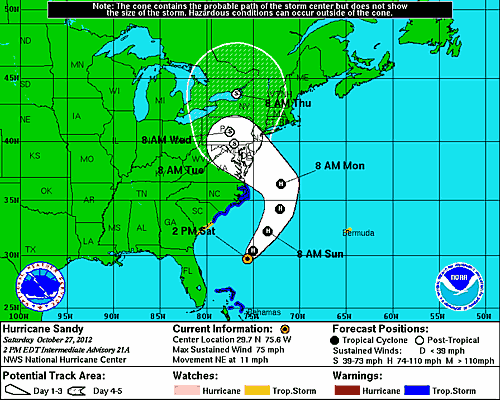 There is one thing every trial lawyer can agree on: Scheduling physician experts for trial is a bitch. It is, without question, the most difficult and stressful of trial practices. Doctors, unless they are retired, need a lot of advance notice so that patients and surgeries can be rescheduled.
There is one thing every trial lawyer can agree on: Scheduling physician experts for trial is a bitch. It is, without question, the most difficult and stressful of trial practices. Doctors, unless they are retired, need a lot of advance notice so that patients and surgeries can be rescheduled.
Both the looming of Hurricane Sandy, and a decision from the Appellate Division (Second Department) three days ago come together to highlight the issue.
First, civil practice as it exists in New York, to set the framework: Cases in New York City, when they are ready for trial, get sent to a trial scheduling part, where you sit with a jillion other lawyers with cases that are trial ready. But your case may get adjourned, even when marked “Final” for a multitude of reasons. There are older cases on the calendar ahead of you. A witness is on vacation. One of the lawyers is actually engaged in trial elsewhere. One of the lawyers begs for more time because the dog ate his cross-exam outline.
Some judges easily (or begrudgingly, depending on how old the case is) grant the application; others scream (or laugh) at you and say Dismissed! Or if the doctor isn’t available, “Subpoena him and we’ll bring him here in chains.” And these judges have broad discretion on how to organize and maintain those trial calendars.
Then the judge that schedules the trial — again, not the judge that will actually try the case — finally sends you to the jury clerk. And you may be told to come back another day because there are no jurors. You may pick a jury, and then be told there are no judges available. Or, you can be assigned to a judge and told to start right away.
You simply cannot control the situation, and the old metaphor of herding cats springs easily to mind. Trying a case is like that.
All the while the lawyers are busy giving updates to clients and witnesses, popping antacids, trying mightily to keep everyone in the loop and praying they can all make it to the courthouse.
Now toss in the concept of a hurricane and the possibility of the courts closing and all (tentative) schedules go kablooie. The Yiddish expression “Oy vey!” will likely now spring to mind.
Enter, stage right, the Appellate Division, in Vera v. Soohoo. On the day the trial was scheduled, the plaintiff’s lawyer informed the court that the indispensable expert was out of town. He had conferred with his adversary, and they agreed to a trial date one month later if the court would agree. But the court would not agree.
The court insisted on a new date, 10 days later, and one day after the expert returned. But the lawyer had another (older) case that was ready to go just a few days later. Too bad, said the court, and the action was dismissed.
Such are the uncertainties of the court system that keep trial lawyers up and night. It is one thing to try a case, but a whole different thing to actually line all the ducks up in a row to get there.
Was this dismissal unfair to the injured plaintiff? You bet it was, said the appellate court, and reinstated the action. While it is true that “a court may dismiss an action when a plaintiff is unprepared to proceed to trial at the call of the calendar,” it was a perfectly reasonable excuse that the plaintiff’s attorney was simply trying to avoid the “overbooking of cases.”
Given that the defendants would not be prejudiced by the short adjournment — they had agreed to a new date the following month — the appellate court said that “The plaintiff should not be deprived of her day in court because of some difficulty in rescheduling a trial date that was convenient for all the parties. We recognize that the Supreme Court has broad discretion in controlling its trial calendar, but that discretion must be exercised in a judicious manner, particularly when an improvident exercise of that discretion will result in the dismissal of a potentially meritorious cause of action.”
Vera v. Soohoo is a pretty good case to keep in your trial bag for when the unexpected pops up and messes with your schedule and you have an unsympathetic judge.
And if you know people who say they never want to try another case, you will understand why.
“Lazy.” That’s the only word for that trial judge. They didn’t want to try the case, saw a chance to get rid of it, and so seized on it.
It is much saner in Maryland. For a Circuit Court (the higher level trial court, usually with a jury) case there is an actual scheduled pretrial hearing, not a cattle call. It doubles as an informal mediation, but should that fail you get a trial date, typically a couple of months later, depending on the county. It is possible that come that date there won’t be a judge or a jury available, but this is uncommon. Should a postponement occur, the new date is in theory set by a judge but in practice arranged by telephone or email by the attorneys’ support staff and a clerk in the court. As hassles go, it is fairly minor. If physician experts are an issue, their secretaries get included in the rounds of discussion.
Pingback: New York Suspends Statutes of Limitations in Wake of Hurricane Sandy – New York Personal Injury Law Blog
Pingback: New York Suspends Statutes of Limitations in Wake of Hurricane Sandy « Accidents, Disabilities, and Compensation! Oh my!